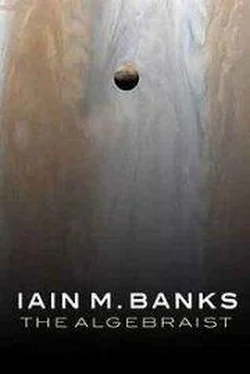“One might also pause to give thought to the reasons why the Engineership Est-taun Zhiffir is accompanied by those elements of the Summed Fleet of which my original has the honour of being part — why, indeed, the Eship Est-taun Zhiffir is escorted by such a preponderance of force at all.” The hologram raised its head, looked all around again. “It might not even be totally unreasonable to call into question the apparently unchallenged assumptions and settled conclusions concerning the destruction of the Ulubis portal by the Beyonders, over two centuries ago.”
That caused a little frisson in the chamber, Fassin noticed. Is any of this still about me and anything I might have found? he wondered. The more I hear, the more I hope it isn’t.
“There is one circumstance, one nexus of contingent information,” the image said with a broad, unamused smile and something like relish, “which is, we strongly suspect, behind all of this.” The projection turned to look directly at the Hierchon Ormilla. “Sir, at this point I must ask that those not specifically cleared to be present at this meeting be withdrawn. I believe we might make an exception for the troopers, providing their ear mikes are turned off, but I would be disobeying my orders if I continued with those not invited still present.”
“Admiral Quile,” the Hierchon boomed, with just sufficient emphasis, “I vouch for all those present who were inadvertently excluded from the clearance list you refer to. You may continue.”
“And were it up to me, sir, that would of course be more than enough reason to proceed without care or reservation,” the Admiral’s image said. “However, devastated though I may be at being seen to offer even the slightest suggestion of an insult to your esteemed court, I am specifically forbidden to continue, bound as I am by the orders of the Complector Council.”
Ouch, Fassin thought. He almost felt sorry for the Hierchon. He’d not just had rank pulled on him, he’d been made to look small. A Sarcomage outranked a Hierchon, and was in turn answerable to a Complector, any single one of which — supremely powerful as they were in every other exercise and iteration of power within the civilised galaxy — themselves had at least to take into account the will of the Complector Council. The unspeakably omnipotent members of the Complector Council were bound by nothing else save the laws of physics, and were generally held to be putting considerable effort into getting round those.
Hierchon Ormilla took his defeat with a degree of grace and within a few minutes the chamber was emptied of half its earlier occupants. The stepped sequence of podia in front of the Hierchon’s imposing esuit now looked positively bare. All the court officials and courtiers had departed, with much muttering and the single highest quotient of affronted dignity Fassin had ever witnessed, by several factors. The military bigwigs were still present, but even their on-podium ranks had been depleted as Colonel Somjomion of the Shrievalty and Clerk-Regnant Voriel of the Cessoria were reduced to stepping down to floor level so that they could operate the two most important pieces of equipment monitoring the cooking-pot device embodying the AI. The mirror-finish troopers still stood in a wide circle beyond, armour locked in at-ease, deaf now.
While all this had been going on, Fassin had been left to sit there, not knowing what to think. He knew what he ought to be thinking; he ought to be thinking, What the fuck could I ever have stumbled across that possibly warranted this level of right-to-the-top paranoia and secrecy? It was, however, hard to know what to think. He also knew what he ought to feel: fear. There, he was fine; he had a superabundance of high weapon-grade trepidation. “Thank you,” the image of the Admiral said. “Now then,” it said, looking round all those who remained. “I have a question for you. What do you know of something called the Dweller List?” It held up one hand. “Rhetorical question. You don’t have to answer. Those of you who wish, feel free to consult your screens or equivalent. Take a moment.”
There was a flurry of distant tapping. The Dweller List? thought Fassin. Oh, fucking hell; not that shit.
The hologram smiled. “Let me in due time tell you what we at this end — as we design and record this signal and projection — consider important regarding this subject.”
Fassin had heard of the Dweller List, of course; no Seer hadn’t. Unfortunately, lots of laypeople had heard of the List, too, and so it had become one of those tired, inward-groan-producing subjects that people tended to raise when they met a Seer at a party, along with other hoary old cliché-questions such as, “Do Dwellers really hunt their own children?” and, “Are they really as old as they say they are?”
The Dweller List was a collection of coordinates. It had turned up, as far as anyone could be sure, towards the end of the Burster War four hundred million years earlier, and was probably well out of date even then. Allegedly, the list detailed all the Dwellers’ own secret arteria portals. According to the story, these had been under development since the time of the Long Collapse, when the Dwellers had decided that the other species — or groups of species — with which they were forced to share the galaxy couldn’t be trusted to keep their own or jointly owned “hole networks safe, and so the Dwellers had better construct an arteria web which they controlled — and which preferably nobody else knew about — if they wanted to voyage from gas-giant to gas-giant reliably and without fuss.
This, of course, completely ignored the Dwellers’ attitudes to time and space and scale and more or less everything else. The Dwellers didn’t need wormholes and the near-instantaneous travel between systems that they offered. They lived for billions of years, they could slow their metabolism and thoughts down as required so that a journey of a thousand years or ten thousand years or a hundred thousand years would appear to be over in the course of a single sleep, or occupied no more time than that required to read a good book, or play a complicated game. Plus they were already everywhere; they claimed they had spread throughout the galaxy during the First Diasporian Age, which had ended when the universe was only two and a half billion years old. Even if that claim was a boast, a typical Dweller exaggeration, what was undeniable was that Dwellers were present in significant numbers in well over ninety-nine per cent of all the gas-giant planets in the galaxy, and had been for as long as anybody could remember. (Though not, as it had turned out, Jupiter. Humanity’s own backyard gas-giant was unusual in being relatively water-poor. The Dwellers considered it a desert planet and rarely visited.)
After centuries of real-time and decades of seem-time spent with Dwellers, Fassin had gained the distinct impression that Dwellers both despised and felt sorry for the Quick — the species, like humans, like all the others in the Mercatoria, which felt the need to use wormholes.
As the Dwellers saw it, to be Quick — to live life that precipitously — was to condemn oneself to an early end. Life had an inescapable trajectory, a natural curve. Evolution, development, progress: all conspired to push a sentient species along in a certain direction, and all you could do was choose to run that road or saunter along it. The Slow took their time, adapting to the given scale and natural limits of the galaxy and the universe as it existed.
The Quick insisted on short cuts and seemed determined to bend the very fabric of space to their frantic, impatient will. When they were smart they succeeded in this wilfulness, but they only brought their own end all the quicker. They lived fast and died faster, describing sudden, glorious but quickly fading trails across the firmament. The Dwellers, like the other Slow, wanted to be around for the long term, and so were prepared to wait.
Читать дальше












